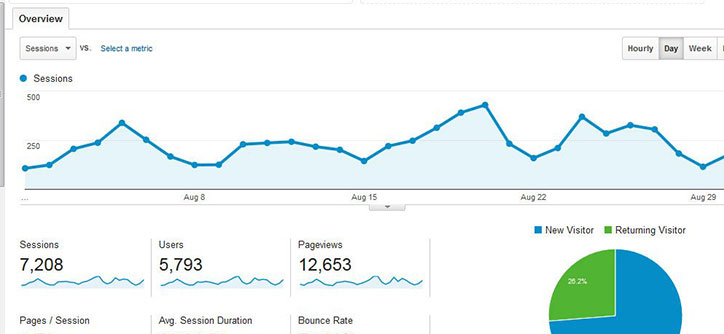Marketing has always been a crucial consideration for all businesses. In fact, marketing alone can make or break a company. If marketing efforts are executed well, customers will naturally be drawn to the brand, with the business’s growth and profitability boosted as a result. However, if marketing efforts aren’t thoughtfully executed, then the company will flounder, lost in a sea of similar businesses, unable to capture the desired attention from their targeted customers.
While the importance of marketing has always been pivotal for businesses, marketing as a concept is dynamic, fluid, and continually moving with the times in order to best align with customer expectations. In recent years, the volatile nature of marketing has been apparent in the shift to digital marketing, a type of marketing that focuses primarily on the online world.
The importance of Digital Marketing
Two-thirds of the world population is now online, with digital media continuing to rise in significance. Seasoned marketers find that their approach is changing and shifting to the digital world when seeking to promote their business. In fact, marketers say that 60% of their time is now reserved specifically for digital marketing, which further exemplifies how marketing has evolved in the 21st century.
This revolution is further proven by a number of statistics, all of which point very clearly towards a future where digital marketing takes centre stage. For example:
- 28% of marketers share that they have greatly reduced their traditional marketing activities to increase expenditure on digital marketing
- Over the next five years, companies believe that 75% of their marketing budget will be dedicated to digital marketing
- 61% of marketers say growing SEO/organic presence is a high inbound marketing priority (HubSpot, State of Inbound 2017)
It is also worth noting that the benefits of digital marketing can be enjoyed by a range of businesses—even physical, offline stores—who may once have assumed that digital marketing was of little benefit to them. For example, 75% of people who find local and helpful information in search results are more likely to visit physical stores.
All the statistics substantiate a fast-moving trend: digital marketing is now a dominant force in marketing, and any business owner seeking to grow their business needs to focus on this area to achieve success.
Everything you need to embrace Digital Marketing
As we have seen, digital marketing is vital to any business, but “digital marketing” is a catch-all term that describes a huge range of different marketing methods, platforms, and strategies. If you have yet to dabble in this world, understanding the different strands of digital marketing can seem like trying to unravel a particularly troublesome knot – but it is possible. Here are our top tips for becoming a successful digital marketing professional and boosting your business growth as a result.
1) Enrol in a cutting-edge digital marketing course

In order to possess fundamental business background knowledge, it is crucial to understand a new subject. Especially when it comes to digital marketing, the best way to begin developing background knowledge is by enrolling in a comprehensive digital marketing course specifically designed for business owners seeking to grow their business. If you choose this route, here’s what you can look forward to:
- You’ll learn to integrate new strategies and tactics with traditional marketing practices in order to improve overall business profitability
- You’ll develop an in-depth and textured understanding of the methods, theories, concepts, and ideas behind the various aspects of digital marketing
- You’ll be taught to design effective marketing strategies for customer acquisition, conversion, and retention
- You’ll learn the essential ingredients which will allow you to build effective marketing strategies that perfectly align with your business objectives
- You’ll develop the ability to confidently lead and execute digital innovation initiatives in all-encompassing areas such as social media, video innovations, and more
- You’ll be able to understand the strategic applications of digital marketing, using the latest digital tools and practices
- You’ll develop the ability to integrate marketing, advertising, sales, and logistics across physical and digital channels to collect, analyse, and interpret digital marketing data
2) Build your brand image

A solid online presence will help ensure your business is noticed by your customers and, subsequently, help to drive sales and growth. You want your brand to be recognized in its field, and this can be achieved by creating powerful, engaging, and interesting content that encourages customers to return to your business time and time again.
To build a brand image online requires several steps:
- Public Relations (PR) – PR involves how others perceive your brand through various platforms such as blogs, news, or reviews. Ideally, it is best to position your brand as a leader with positive feedback from customers. This enhances the brand image greatly and raises awareness.
- Content creation – Content helps to keep your customers engaged with the brand. Delivering content that is new, interesting, and relevant will help customer stay loyal to the business. Content includes blog articles and viral social media posts. Customers may share this content with others and check for updates regularly.
- Social Media – Social media has become a popular tool for communicating with customers and sharing information. A good social media presence is important to reach out to potential and existing customers.
- Search Results –Search Engine Optimisation (SEO) is an important strategy for companies to appear in keyword searches that link to the brand. As a result, it helps companies to match what people are looking for online, be it a product or service. Online traffic generated will help to drive more qualified leads.
3) Learn the Lingo

Successful digital marketing requires an understanding of the basics. Take the time to learn more about digital marketing terms such as PPC, SEO, SEM, CTR, bounce rate, and sales funnels. You need to get to a point where you can reference these things with ease thanks to an inbuilt understanding of what they mean. A digital marketing course will assist you in this regard and should ensure you’re comfortable enough to use a variety of marketing terms and acronyms that were once completely unfamiliar to you.
4) Research, test, and try

One of the greatest benefits of digital marketing is that it is hugely responsive. With traditional marketing, business owners are forced to formulate a strategy and let it run for weeks – if not months – before they are able to analyze how well it has performed. Digital marketing, on the other hand, is responsive; you can continually analyse your performance and make tweaks to your strategy “on the fly”, testing new ideas and abandoning old ones as and when you please. What’s more, every time you research, implement, and adopt new strategies, your knowledge of digital marketing continues to grow.
5) Stay updated on the latest trends

If you were able to travel back in time and talk to a digital marketer working five years ago, the majority of the strategies that were used then would seem incredibly out-of-date. Digital marketing trends change at a rapid pace, with techniques that were once considered to be vital quickly being overtaken by new innovations that are ever more effective. As a result, to truly master digital marketing, you must build on your foundational knowledge by continuously adapting, implementing new trends, following patterns, and always seeking new ways to improve your strategy in order to drive growth.
6) Understand business metrics

If you’re focusing on digital marketing to grow your business, you’re going to need the perfect means and means of measuring that growth. It’s therefore important to take the time to develop and understand a range of business metrics related to each marketing channel, so you can see exactly what is and isn’t working for your business. In addition, effective use of metrics also helps ensure you can prioritise your marketing spend by investing in channels that are producing good results while withdrawing from those that have been less than fruitful.
7) Be open to trying new ideas

Often, no one knows whether a digital marketing idea will be successful until someone tries it. As a result, it’s healthy to be willing to take risks with your strategy. For example, the digital marketing strategy can be successful if you can detect unfavourable results from the online campaign and respond with new ideas to overcome them, such as coming up with creative ad copies or setting different audience targeting. You never know, you might discover the next great digital marketing trend!
8) Analyse your competitors’ digital marketing efforts

Continually monitor your competitors’ digital marketing approaches, looking at ideas they have implemented and which elements of digital marketing they are focusing on. If they are overlooking an area—for example, they are not doing much in terms of social media—then you could strengthen your efforts in this area, effectively filling the gap and capturing the attention of your customers.
9) Be patient when trying something new

Digital marketing success rarely happens overnight; instead, it’s a careful build. It takes time to test what works and what doesn’t work. Therefore, it is good practice to do A/B testing. Advertisers try 2 different variations of the same ad to compare and see which ad copy performs better. Whenever you try something new, always seek to give it time to “bed in” and carefully analyse the results for several weeks or months. Many forms of digital marketing are slow burns, so give each effort the breathing space it requires to thrive.
10) Start small

As we’ve mentioned, there are many different types of digital marketing, and in time, you will want to explore all the available possibilities. However, trying to do everything at once can be hugely overwhelming, possibly diverting your focus and preventing any single strategy from realising its full potential. If you’re new to digital marketing, start small; learn the theory behind as many different marketing types as possible, but only put a few of these into practice initially. As your confidence and success grow, you can widen your overall approach and add more strings to your digital marketing bow.
Conclusion
Follow all our tried-and-tested tips and begin your journey as a successful digital marketer to boost your business growth starting today!
Feel free to get in touch with our educational consultants for a free consultation. We would love to help you jump-start your digital marketing career with our programs and courses.